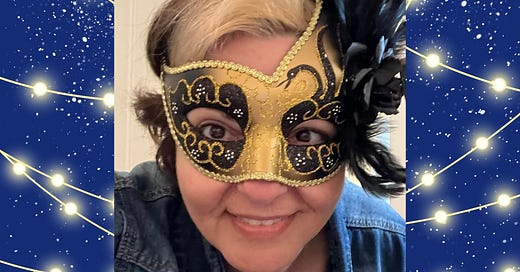Unmasking Autism Diary #21: Inevitable Tradeoffs of Unmasking Autism at the Holidays
Read now (3 mins) | Neuro-swan: from inside Angela's Autistic mind
December 19, 2023
Dear Diary,
I know that unmasking is a privilege. Not everyone can do it safely. I’d say most people can’t. Many risk losing their job or key relationships and—in some cases—basic necessities like food and shelter that are conditional on your willingness to try to act neurotypical.
It’s quite the Catch 22 because for many Autistic it can start to feel like you just can’t take the constant trying and failing to be a duck when you are a swan.
I used to be so hopeful that with effort I would ‘get better,’ ‘be good,’ stop rocking the boat, start playing nice in the sandbox. And then, sometime after my late-in-life diagnosis it clicked. This *is* who I am. No swan is going to succeed at being a duck.
Pretending or masquerading as a duck means I will always be an ugly duckling—someone difficult to get along with who has a bad personality—but there is a chance, no matter how small, that I can be a totally delightful swan.
The more I hung out with other swans, the happier, calmer, less frustrated with myself I felt. But when I would return to people I knew from my “duck days” and say “Hey-oh! Just a reminder. Love y’all but I’m not a duck,” the pressure would mount not to upset the apple cart.
Why do you have to talk about not being a duck?
We love you the way you are, just don’t make such a big deal.
If someone says something that triggers your justice sensitivity, don’t mention it.
If you feel like stimming, suppress that. It makes other ducks uncomfortable.
Not enjoying the talk of weather and sportsball? Have you tried just suffering through it?
Restraining stimming, not calling out racism or other injustice, allowing your body to get disregulated while sitting through meaningless small talk, holding back a meltdown for hours…That’s not behaving socially appropriately or being “good,” that, my swan-friend is masking. And it wears autistic people out.
It leads to mental health distress, burnout, and triggers gastrointestinal issues and other physical health problems. Unmasking is healthier and saves lives.
It’s part of why identity-first language is so important to Autistic people. Unmasking often requires breaking the rules of families and businesses that would prefer you continue with the masquerade of being a duck.
If you are lucky, your family or employer will accept your neuro-swan nature. If you aren’t lucky in that way, you have a choice: unmask and give up those relationships or keep masking and try to mitigate the effects. Both choices are difficult and highly personal. Both come with risks that only you can weigh.
For many, the holidays force this choice where it can feel like you are very much alone. But my neuro-swan friends—you are not alone. And you are not a duck.
Going into this holiday season, my wish for you is that you find a way through that works for you.
May you stay regulated.
May you stay true to your nature.
May you feel love and acceptance where it is offered.
May you find it in your heart to forgive those who have wronged you.
May you find the peace of the season.
Thanks to Whitney Goodman from @sitwithwhit for these (below) reminders of why it is worth it, for the generations who follow you, to break the bonds of generational dysfunction if you can safely do so.






***
The Dear Diary Project is a public journaling project where I’m publicly sharing my diary entries as part of my annual goals. No harm is intended by these posts. My goal is to gain clarity for myself and hopefully help others, especially autistic adults, who are trying to make sense of the communication challenges we face.
“Masking is a common coping mechanism in which Autistic people hide their identifiably Autistic traits in order to fit in with societal norms, adopting a superficial personality at the expense of their mental health. This can include suppressing harmless stims, papering over communication challenges by presenting as unassuming and mild-mannered, and forcing themselves into situations that cause severe anxiety, all so they aren’t seen as needy or “odd.”
—Unmasking Autism, Dr. Devon Price
*Background note: Most people only have a vague (often, highly stereotyped) version of autism in their minds and believe that autistic children need (traumatic) ABA therapy to "overcome" their disability and appear "normal." After receiving an autism diagnosis in her thirties, Dr. Angela Lauria realized that she too had been mostly unaware of what it means to be Autistic. Like so many people, she started her journey by first gathering information and resources from the omnipresent (and problematic) Autism Speaks, but eventually moved away from the 'autism community' in favor of the 'Autistic community,' where she found kinship with other Autistic individuals and learned to let go of pathologizing language like 'autism spectrum disorder' and 'Asperger's Syndrome.' This autism blog (and her autism podcast, "The Autistic Culture Podcast") is meant to share her lived-experience insights to support others on a similar journey of diagnosis, understanding, and community. Embrace Autism--differences are not deficits.





